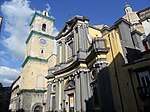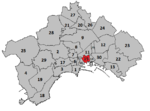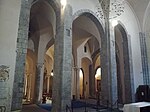Santa Maria Egiziaca a Forcella
1683 establishments in Italy17th-century Roman Catholic church buildings in ItalyBaroque architecture in NaplesChurches in NaplesRoman Catholic churches completed in 1683

Santa Maria Egiziaca a Forcella (or church of Santa Maria Egiziaca all'Olmo) is a Baroque-style, Roman Catholic church located in the quartiere di Forcella, in the city of Naples, Italy;
Excerpt from the Wikipedia article Santa Maria Egiziaca a Forcella (License: CC BY-SA 3.0, Authors, Images).Santa Maria Egiziaca a Forcella
Corso Umberto I, Naples Pendino
Geographical coordinates (GPS) Address External links Nearby Places Show on map
Geographical coordinates (GPS)
| Latitude | Longitude |
|---|---|
| N 40.849634 ° | E 14.264282 ° |
Address
Chiesa di Santa Maria Egiziaca a Forcella
Corso Umberto I
80142 Naples, Pendino
Campania, Italy
Open on Google Maps











